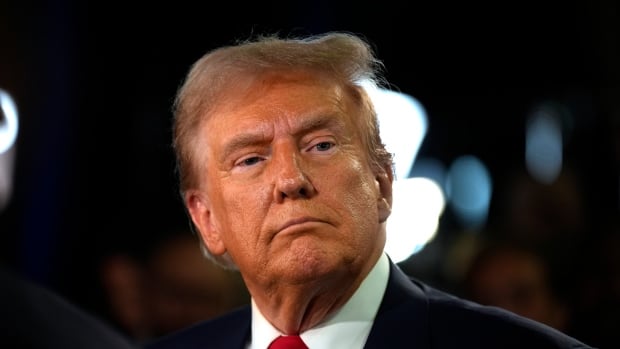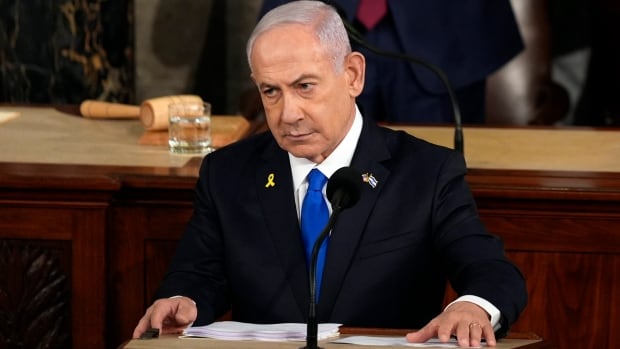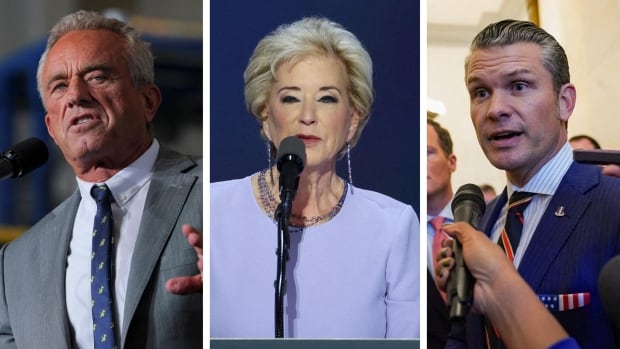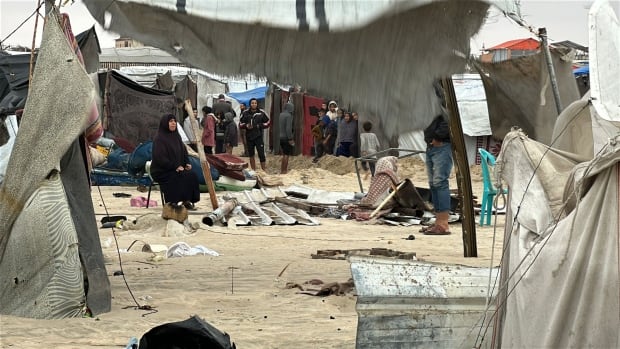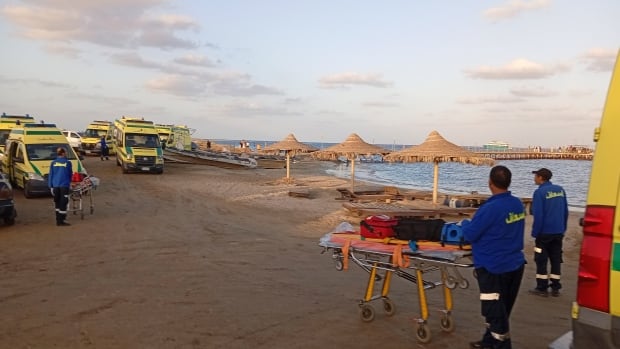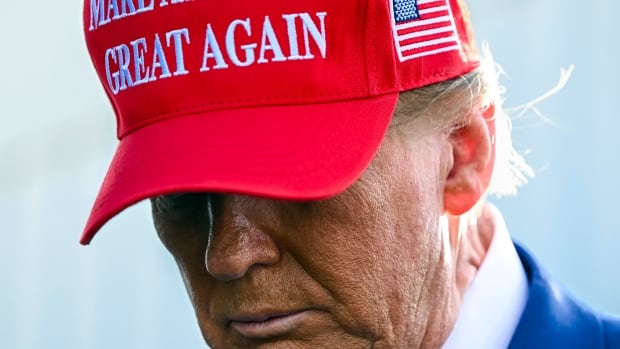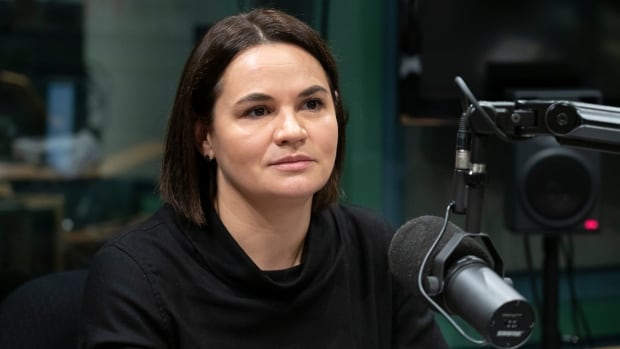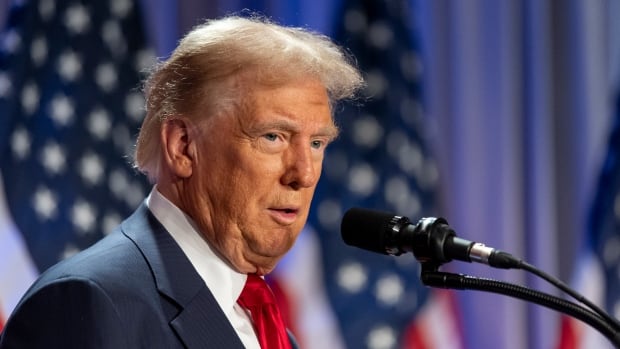A ceasefire between Israel and Iran-backed group Hezbollah will take effect on Wednesday after both sides accepted an agreement brokered by the United States and France, U.S. President Joe Biden said on Tuesday.
The accord clears the way for an end to a conflict across the Israeli-Lebanese border that has killed thousands of people since it was ignited by the Gaza war last year. It's meant to be a permanent cessation of hostilities, Biden said.
Biden, who gave remarks at the White House shortly after Israel's security cabinet approved the agreement in a 10-1 vote, said he had spoken to Israeli Prime Minister Benjamin Netanyahu and Lebanese Prime Minister Najib Mikati. Fighting would end at 4 a.m. local time on Wednesday (9 p.m. ET on Tuesday), Biden said.
 Israeli Prime Minister Benjamin Netanyahu's security cabinet has approved a ceasefire deal with Hezbollah, clearing the way for the truce to take effect. (Julia Nikhinson/The Associated Press)
Israeli Prime Minister Benjamin Netanyahu's security cabinet has approved a ceasefire deal with Hezbollah, clearing the way for the truce to take effect. (Julia Nikhinson/The Associated Press)"What is left of Hezbollah and other terrorist organizations will not be allowed to threaten the security of Israel again," he said.
Israel will gradually withdraw its forces over a period of 60 days as Lebanon's army takes control of territory near its border with Israel to ensure that Hezbollah does not rebuild its infrastructure there, Biden said.
"Civilians on both sides will soon be able to safely return to their communities."
French President Emmanuel Macron cheered the signing of the deal on social-media platform X, saying it was "the culmination of efforts undertaken for many months with the Israeli and Lebanese authorities, in close collaboration with the United States."
Lebanon's Mikati issued a statement welcoming the deal. Lebanese Foreign Minister Abdallah Bou Habib earlier said the Lebanese army would be ready to have at least 5,000 troops deployed in southern Lebanon as Israeli troops withdraw.
Netanyahu said he was ready to implement a ceasefire deal and would respond forcefully to any violation by Hezbollah.
Netanyahu, who faces some opposition to the deal from within his coalition government, said the ceasefire would allow Israel to focus on the threat from Iran, replenish depleted arms supplies and give the army a rest. It would also serve to isolate Hamas, the Palestinian militant group that triggered war in the region when it led an attack on Israel on Oct. 7, 2023.
"We will enforce the agreement and respond forcefully to any violation. Together, we will continue until victory," Netanyahu said.
"In full co-ordination with the United States, we retain complete military freedom of action. Should Hezbollah violate the agreement or attempt to rearm, we will strike decisively."
Netanyahu said Hezbollah, which is allied to Palestinian militant group Hamas, was considerably weaker than it had been at the start of the conflict.
"We have set it back decades, eliminated ... its top leaders, destroyed most of its rockets and missiles, neutralized thousands of fighters, and obliterated years of terror infrastructure near our border," he said.
Jeanine Hennis-Plasschaert, the UN's special co-ordinator for Lebanon, welcomed the ceasefire deal in a statement, commending the parties to the agreement.
"Now is the time to deliver, through concrete actions, to consolidate today's achievement."
A senior U.S. official, briefing reporters on condition of anonymity, said the U.S. and France would join a mechanism with the UNIFIL peacekeeping force that would work with Lebanon's army to deter potential violations of the ceasefire. U.S. combat forces would not be deployed, the official said.
The Lebanon ceasefire came after a change of attitudes on both sides in late October, the official said.
WATCH | Reports of potential ceasefire deal between Israel and Lebanon day earlier: After months of escalating violence, a ceasefire deal in Lebanon between Israel and Hezbollah is reportedly ‘very close.’ Israel’s war cabinet is believed to be preparing to vote on the terms of the deal.Biden, who leaves office in January, said his administration would continue to push for a ceasefire and hostage-release deal in Gaza, where Israel is battling Hamas, as well as for a deal to normalize relations between Israel and Saudi Arabia.
Despite the diplomatic breakthrough, hostilities raged as Israel dramatically ramped up its campaign of airstrikes in Beirut and other parts of Lebanon, with health authorities reporting at least 18 killed. Another airstrike shook Beirut shortly after the ceasefire was announced.
The Israeli military said it struck "components of Hezbollah's financial management and systems" including a money-exchange office.
Israel issued more evacuation warnings late on Tuesday, just hours before the ceasefire was due to take effect.
Hezbollah also kept up rocket fire into Israel.
Israel's air force intercepted three launches from Lebanese territory, the military said, in an extensive missile barrage on Tuesday night that led to warning alarms in approximately 115 settlements.
Alia Ibrahim, a mother of twin girls from the southern village of Qaaqaiyat al-Snawbar, who had fled nearly three months ago to Beirut, said she hoped Israeli officials would be faithful to the deal.
"Our village — they destroyed half of it. In these few seconds before they announced the ceasefire, they destroyed half our village," she said. "God willing, we can go back to our homes and our land."
Opponents to the deal in Israel include opposition leaders and heads of towns near Israel's border with Lebanon, who want a depopulated buffer zone on Lebanon's side of the frontier.
Both the Lebanese government and Hezbollah have insisted that a return of displaced civilians to southern Lebanon is a key tenet of the truce.
Israeli Security Minister Itamar Ben-Gvir, a right-wing member of Netanyahu's government, said on social media platform X the agreement does not ensure the return of Israelis to their homes in the country's north and that the Lebanese army does not have the ability to overcome Hezbollah.
"In order to leave Lebanon, we must have our own security belt," Ben-Gvir said.
More than 3,760 people have been killed by Israeli fire in Lebanon in the past 13 months, many of them civilians, according to Lebanese health officials. The bombardment has driven 1.2 million people from their homes.
Hezbollah began attacking Israel on Oct. 8, 2023, a day after Hamas-led attacks on southern Israel, in support of the Palestinian militant group. That has set off more than a year of fighting and escalated into an all-out war in September, with massive Israeli airstrikes across Lebanon and an Israeli ground invasion of the country's south.


